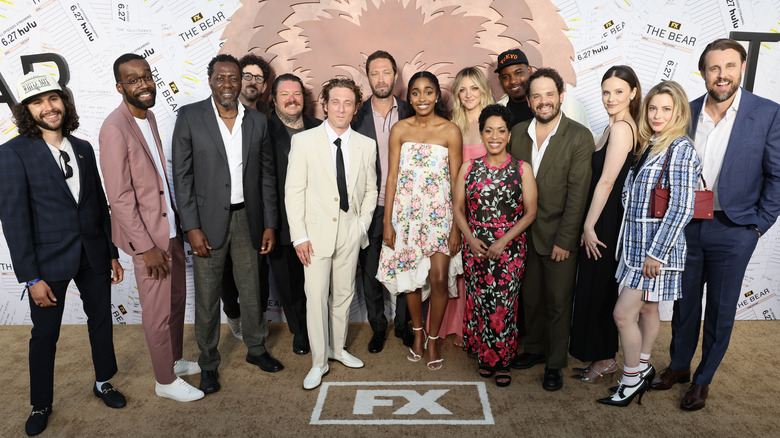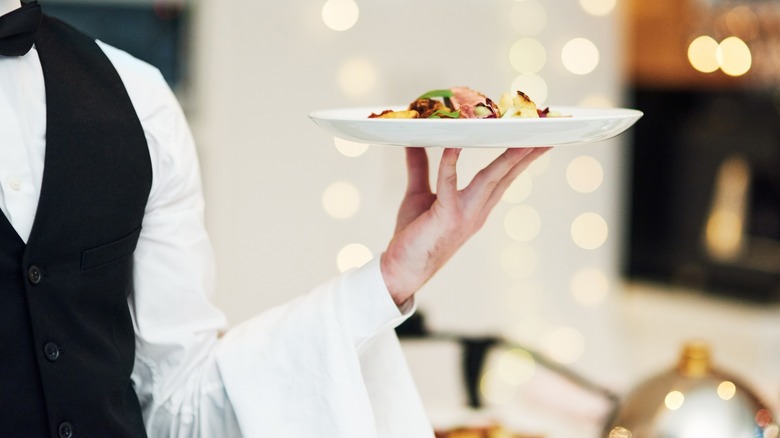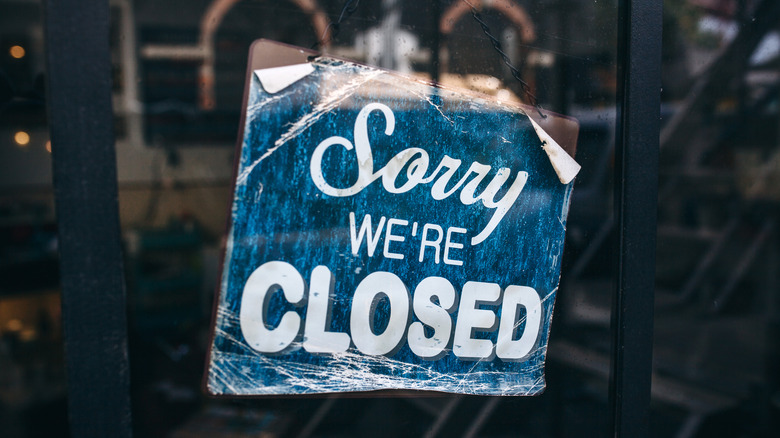The Bear Season 3 Nails The Harsh Realities Of Opening A Restaurant
Contains spoilers for "The Bear," Season 3, Episodes 3 and 5.
FX's original hit series "The Bear" — which follows Carmy Berzatto (played by Jeremy Allen White), a fine-dining chef who returns to Chicago to save his family's sandwich shop — doesn't shy away from depicting the stresses of the restaurant industry. Its third season is no different, especially now that the chaotic Berzatto clan have flipped their humble Italian beef joint into an ambitious restaurant called The Bear. Of course, the food is beautiful, but the costs of a constantly changing menu — the embodiment of Carmy's non-negotiables (a list of his must-haves for the restaurant) – are catching up to The Bear.
In Season 3, Episode 5, the Bear team meets with investor Uncle Jimmy (Oliver Platt) and his numbers guy, The Computer, who inform them that the restaurant is losing money. Confronted with the steep costs and the ominous news that Ever, the Michelin-starred restaurant where he first trained, is closing, Carmy begins to consider the bitter possibility that The Bear is destined for failure.
While "The Bear" follows a fictional restaurant, the looming threat of closure is all too familiar for new restaurants in the real world. According to data from the National Restaurant Association, about 60% of restaurants fail in their first year, while 80% fail within the first five. Between slim profit margins and issues with inventory, the odds are stacked against new eateries — even if they're popular. As "The Bear" shows, everything's a balancing act when money's involved, and managing a new restaurant often requires reining in the creativity and compromising on microgreens.
Running a good restaurant is really expensive
Between operating costs and menu research and development, running a restaurant is far from cheap. Professional chefs want to prepare the best food possible, but the highest-quality ingredients come at a cost. That much is made clear in Season 3, Episode 3 of "The Bear" when Uncle Jimmy asks Carmy about an $11,268 bill for butter. Other questions arise as to what the fictional fine-dining restaurant is willing to sacrifice — from pretty flowers to Marcus (Lionel Boyce), the pastry chef — to make the budget work. Clearly, the goal to make The Bear a Michelin-starred restaurant involves some overspending that has yet to pay off — if it ever will. These are exactly the types of real considerations and compromises that restaurants are forced to make every day.
Profit margins are notoriously slim in the restaurant industry, so there's rarely room for frivolous spending. With food and labor costs alone accounting for a third of every dollar in sales (never mind rent, maintenance, or other supplies), a typical restaurant earns about 5% in pre-tax profits (via National Restaurant Association). To survive, new restaurants have to find balance and fast; there's only so much cash runway to burn through before things sour. While it's essential to figure out what food suits the establishment and makes it stand out, deciding where to source inventory is just as important, as the kitchen crew discovers in Episode 5 when line cook Tina's (Liza Colón-Zayas) morning farmers' market trip doesn't go as planned.
Busy and great aren't always good enough
Another thing "The Bear" gets right about the restaurant industry is that a busy dining room doesn't always mean the business is in good shape. As Natalie (Abby Elliott), Carmy's sister, sits down to look at the restaurant's finances in Episode 3, she worries that even if The Bear fills 60 seats a night, five nights a week, 52 weeks a year, they still won't get by — the numbers just don't add up. To actually make money, they need to add half a turn (the cycle between tables during service) or start operating six nights a week. Either way, the change will mean more hard work from the staff, who are already wearing out.
The Bear is experiencing what many in the real-world restaurant industry already know: Effort isn't everything, as even great restaurants don't always last, shuttering their doors while others in the industry bear witness. Even Noma, one of the best restaurants in the world, isn't immune, having announced its plans to stop regular service at the end of 2024. The fine-dining destination in Copenhagen, which is featured in "The Bear," plans to convert to a full-time food lab. Co-owner and chef René Redzepi told The New York Times that the modern fine-dining model is unsustainable: "Financially and emotionally, as an employer and as a human being, it just doesn't work."
While "The Bear" may not always be a realistic representation of the industry (for instance, Ever, the real-life restaurant in Chicago hasn't announced any plans to close), the costly and often cutthroat environment it showcases reflects the risks facing restaurants both new and established.


